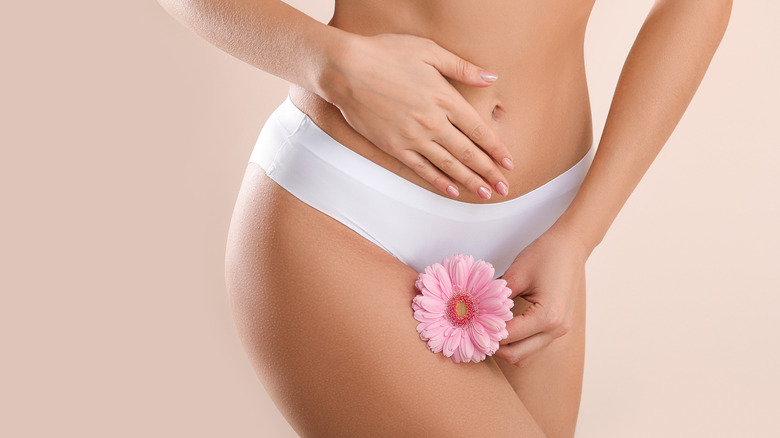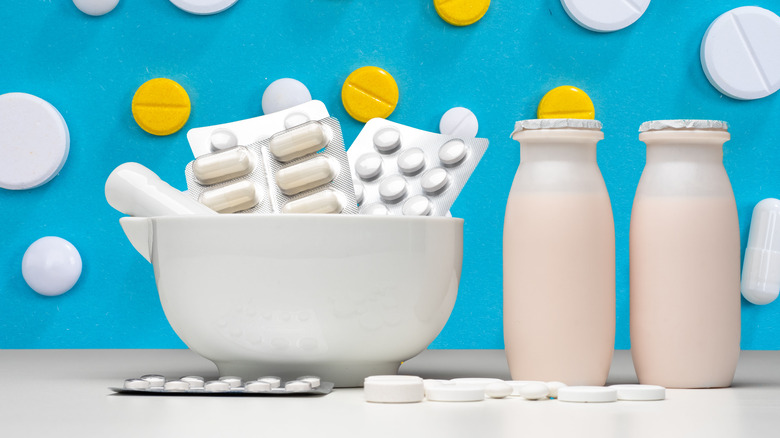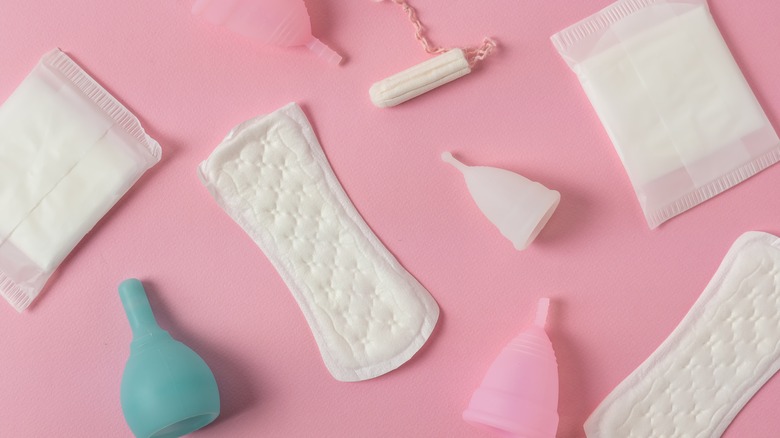What Are Vaginal Probiotics And Should You Be Taking Them? - Exclusive
Modern society has a strong aversion to bacteria. The word alone can trigger an almost Pavlovian response that sends us reaching for the hand sanitizer. It wasn't until Jamie Lee Curtis' Activia commercials in 2010 that many of us learned bacteria could actually be beneficial to the body.
The National Human Genome Institute says that a microbiome is a "community of microorganisms (such as fungi, bacteria and viruses) that exists in a particular environment." There are multiple microbiomes inside the human body, each ever-changing in response to various environmental factors, including our eating and exercise habits and different things we introduce to our bodies, like medications. While the body is home to a large microbiome, containing 100 trillion microbes, the vagina's microbiome has more than 50 microbes living together in harmony (per Cleveland Clinic).
Within this microbiome there are probiotics, which are good bacteria and yeasts that live inside the body and help it to function properly by balancing out the bad bacteria that also inherently exists within each microbiome (per Cleveland Clinic). We can introduce more probiotics to our bodies by eating fermented foods like yogurt, pickles, or sauerkraut, drinking kombucha, or taking probiotic supplements.
While most of us know our gut benefits from additional probiotics, Mary Jane Minkin, M.D., OB-GYN – a professor at Yale University School of Medicine — sat down for an exclusive interview with Health Digest to explain what vaginal probiotics are and if we should be taking them for optimum vaginal health.
What is the vaginal microbiome and how can probiotics help?
In regard to the vaginal microbiome, Dr. Minkin describes it as "Communities of bacteria that exist in the female genital tract, primarily dominated by Lactobacillus. Lactobacillus is known as the 'good guy bacteria,' which typically outnumbers the anaerobes or the 'bad guy bacteria' in the vagina. The balance of these bacteria in the microbiome keeps the vaginal environment slightly acidic, maintaining an average pH balance of 3.8–4.5. If vaginal pH is off, it could be a sign of a bacterial imbalance as well."
When a pH imbalance exists within the vagina, it can lead to bacterial vaginosis or yeast infections, which include symptoms like thick, chunky discharge, a foul or fishy odor, and uncomfortable itching (per Healthline). But probiotics can help. "Vaginal probiotics work to keep the bacteria in the vagina balanced. Some can be taken orally while others as a suppository," says Dr. Minkin, adding, "Taking probiotics can help to restore a healthier balance of bacteria in the vagina, eliminating unusual odor, itch, and discomfort."
Who should be taking vaginal probiotics?
While Insider explains that probiotic supplements won't do much if you're not experiencing any issues, Dr. Minkin says, "Anyone that senses they are experiencing a bacterial imbalance might consider implementing them into their routine. If you are having problems like discharge, itch, or odor, then I would recommend the probiotic. I recommend taking the RepHresh Pro-B Probiotic, as it is clinically shown to balance yeast and bacteria."
If you're keen on keeping your vaginal microbiome healthy, it's important to know why imbalances occur. "There are many things that can throw off the vaginal microbiome such as menstrual blood, semen, washes, douches, soaps, and other scented products, as well as taking antibiotics," says Dr. Minkin. Avoiding douching and scented vaginal products can reduce the risk of imbalance, but if one does occur, it's nice to know that vaginal probiotics are there to save the day when we need them!
To learn more about Dr. Mary Jane Minkin, visit her profile at Yale School of Medicine. You can learn more about the vaginal probiotic she recommends here.


